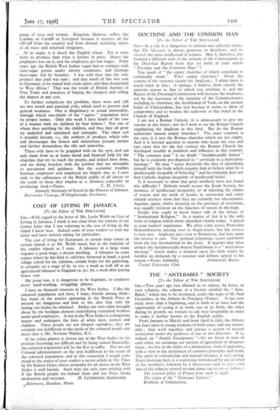DOCTRINE AND THE COMMON MAN
[To the Editor of THE SPECTATOR] SIR,—As a rule it is dangerous to criticise any editorial article, but The Spectator is always generous to dissidents, and its clientele the most intellectual of readers. May I, therefore, put forward a different view of the attitude of the Convocations to the Doctrinal Report from that set forth in your article " Doctrine and the Common Man " ?
You speak of " the empty churches of which complaint is continually made." What empty churches ? From the context of the sentence clearly the Anglican ; I admit there is much truth in this ; it springs, I believe, from exactly the opposite reason to that to which you attribute it, and the Report of the Doctrinal Commission will increase the weakness, not by the insistence of the majority of the Commissioners, including its chairman, the Archbishop of York, on the ancient belief of Christendom, but just because it seems to allow of compromise and to weaken the authority of this belief in the Church of England.
I am not a Roman Catholic (it is unnecessary to give my reasons in this letter), nor do I wish to see the Roman Church supplanting the Anglican in this land. But do the Roman authorities lament empty churches ? The exact contrary is the case, it is just the Roman churches which are not empty. And it is beyond question to anyone who keeps his eyes and ears open -that for the last century the Roman Church has developed steadily in numbers and influence in this country. "-The common man " is no doubt " fundamentally honest " but he is evidently pre-disposed to " servitude to a meticulous theology." He may " reject decisively the idea of identifying himself with the body which requires him to believe what he is intellectually incapable of believing " and he evidently does not find Catholic dogmas incapable of intellectual belief.
Is it necessary to show that great intellects have not found this difficulty ? Nobody would accuse the Jesuit Society, for instance, of intellectual incapacity, or of rejecting the claims of reason and the work of Jesuits in astronomy and other natural sciences show that they are certainly not obscurantist. Aquinas, again, whilst insisting on the province of revelation, was equally insistent on the function of reason in theology.
People who ought to know better talk of the failure of " Institutional Religion." As a matter of fact it is the only form of religion which shows abundant vitality today. I appeal to your readers' experience. We often come across Protestant Nonconformists passing over to Anglicanism, but the reverse is very rare. Anglicans pass over to Romanism, but here again the reverse is rare. The spiritual pilgrimage seems uniformly from the less Institutional to the more. It appears that what attracts the fundamentally honest Englishman is a " meticulous theology " which makes a demand upon his faith whilst he fortifies its demands by a constant and definite appeal to his


















































 Previous page
Previous page